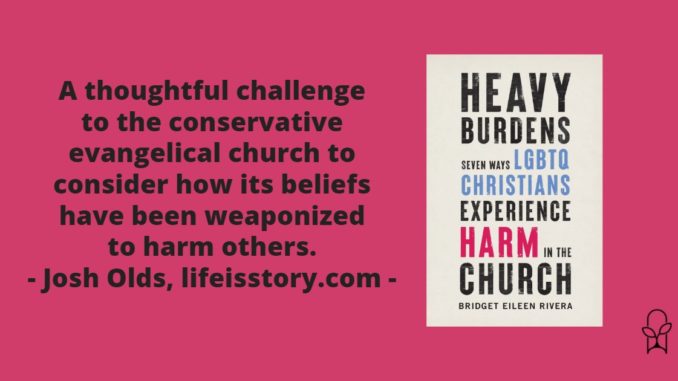
Published by Brazos Press on October 26, 2021
Genres: Non-Fiction, Christian Life
Buy on Amazon
Goodreads

Religious faith reduces the risk of suicide for virtually every American demographic except one: LGBTQ people. Generations of LGBTQ people have felt alienated or condemned by the church. It's past time that Christians confronted the ongoing and devastating effects of this legacy.
Many LGBTQ people face overwhelming challenges in navigating faith, gender, and sexuality. Christian communities that uphold the traditional sexual ethic often unwittingly make the path more difficult through unexamined attitudes and practices. Drawing on her sociological training and her leadership in the Side B/Revoice conversation, Bridget Eileen Rivera, who founded the popular website Meditations of a Traveling Nun, speaks to the pain of LGBTQ Christians and helps churches develop a better pastoral approach.
Rivera calls to mind Jesus's woe to religious leaders: "They tie up heavy burdens, hard to bear, and lay them on the shoulders of others; but they themselves are unwilling to lift a finger to move them" (Matt. 23:4). Heavy Burdens provides an honest account of seven ways LGBTQ people experience discrimination in the church, helping Christians grapple with hard realities and empowering churches across the theological spectrum to navigate better paths forward.
For they preach, but do not practice. They tie up heavy burdens, hard to bear, and lay them on people’s shoulders, but they themselves are not willing to move them with their finger. – Matt. 23:3-4
Heavy Burdens: Seven Ways LGBTQ Christians Experience Harm in the Church takes this verse from Matthew—Jesus speaking of the Pharisees—and applies it to the relationship between queer Christians and the church. And if you’re a part of the church, particularly if you’re a part of the church that holds to a traditional sexual ethic, that probably doesn’t sit well with you. Nobody wants to be the Pharisees. But just be silent for a moment and listen.
Heavy Burdens is written by Bridget Eileen Rivera, a lesbian who follows the traditional sexual ethic. She acknowledges her orientation, but her convictions have led her to choose celibacy. This book doesn’t debate whether or not same-sex marriage is biblical (though it did help me better contextualize some of the so-called clobber verses), but unpacks the consequences of LGBTQ discrimination regardless of your theological position.
Rivera breaks the book into seven burdens, devoting two chapters to each. Each of these burdens could easily be their own book. Although it might make for a lengthy review, I think it’s worth breaking down each burden here.
Burden #1: The church tells straight people that sex in marriage is the most fulfilling experience in the world, then tells them that they should never have sex or get married. Christians have elevated the sexual drive to an idol, proclaimed that celibacy is unfeasible, but then demanded it of gay Christians.
Burden #2: The church views queer people as pathological sinners. While other Christians do sin, they do not define themselves by their sin. LGBTQ Christians are often defined by what is perceived to be a sin and are not shown grace.
Burden #3: The church perceives LGBTQ people to be a moral enemy. Even if LGBTQ people commit to celibacy and follow traditional teaching, it’s often not enough. It’s not a progressive sexual ethic that the church opposes, it’s LGBTQ people themselves.
Burden #4: Most heterosexual Christians are keen to interpret Scripture in light of historical and cultural context and deeply evaluate the text when it comes to issues they have questions about, but when it comes to LGBTQ issues, the plain reading of one non-contextualized verse in an English-language Bible is supposed to settle the argument.
Burden #5: Alongside a traditional sexual ethic often comes traditional complementarian gender roles. LGBTQ individuals rarely fit neatly inside that system.
Burden #6: The Bible says that humans are made in the image of God, but many Christians ask LGBTQ people to be made in the image of their biological sex.
Burden #7: There is a double standard when it comes to sexual sin. Christians offer grace for heterosexual sexual sin, but condemn homosexual sexual sin.
To make its case, Heavy Burdens opens each chapter with a real-life example of this burden playing out. These aren’t abstractions. They’re real-life examples. Rivera also traces the history behind some of these burdens, detailing how the cultural movement of Christianity created or increased these burdens over the past century.
Perhaps most interestingly, given that Rivera follows a traditional sexual ethic, I found her chapters on the need to explain Scripture contextually very compelling toward the argument that Paul is not condemning homosexuality. In particular, her discussion the cultural context of 1 Corinthians sheds an important light on some very misinterpreted passages.
Heavy Burdens is a prophetic proclamation that the church has done wrong. It points to the wounds of LGBTQ Christians and doesn’t try to argue theology or debate what position is right. Instead, it takes the church to task for weaponizing its beliefs in a way that harms, rather than heals.
My one criticism is that Heavy Burdens makes the assumption that you can hold to a traditional sexual ethic and not harm LGBTQ individuals. There are many progressives who might argue against that, and I think that needed to be addressed. I would have also liked to have understood more about why Rivera holds to a traditional sexual ethic.
Overall, Heavy Burdens is a thoughtful, powerful, introspective look at the conservative, evangelical church that asks to seriously look at its expression of its beliefs to see how it has been weaponized to harm. This is an important book, one that we must grapple with. Rivera calls Christians from this background to realize our complicity in this harm and to repent.
